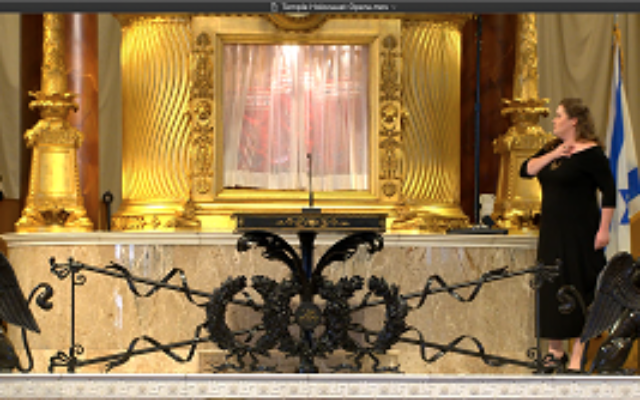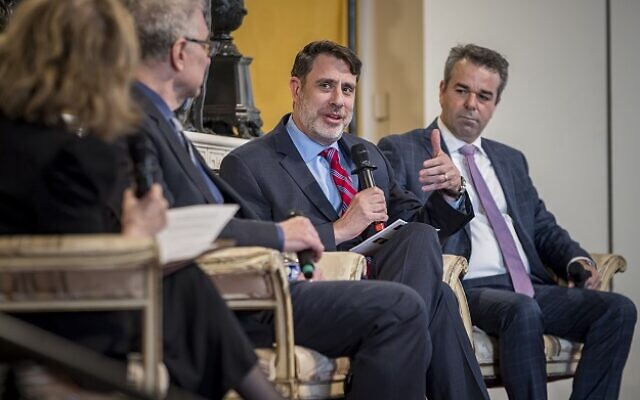‘Another Sunrise’ Honors Holocaust Remembrance Day
Performance at The Temple was followed by a discussion about memory and identity.

As a prelude to this year’s observance of Yom HaShoah, Holocaust Remembrance Day, The Temple presented a production by the Atlanta Opera of “Another Sunrise.” The work, which has been described as a lyrical drama, was performed in the sanctuary of the Reform temple in Midtown. It featured the Romanian American soprano Esther Tonea as Sonia Landau, a Jewish survivor of the Auschwitz concentration camp.
The 27-minute work by composer Jake Heggie with a libretto by Gene Scheer is based on Landau’s life and work as the author of two memoirs, “I Survived Auschwitz,” which was published in 1946 just after World War II, and “Empty Water: A Memoir of the Warsaw Ghetto,” which was published 17 years later in 1963. She wrote both under the pen name, Krystyna Zywulska, a moniker she adopted when she was first arrested by the Gestapo in 1943.
As Zywulska, she assumed the identity of a non-Jewish member of the Polish resistance. The ruse helped her survive in the nightmarish Nazi death camp, but in the work that was performed at The Temple she is haunted by the memories of the days and nights she endured.

She worked in the Effectenkammer, the warehouse adjacent to the gas chambers, where she sorted through the possessions of Jews before they were murdered next door. It kept her alive but at a great cost to her psychological wellbeing, as she listened to the endless cries of those going to their death.
The trauma was so great that even after the war and the publication of her first book she made no mention of her Jewish ancestry. It is this tension between memory and identity that Gene Scheer, who wrote the lyrics for the work, sees as the heart of the work.
Scheer, who was part of a discussion at The Temple that followed the performance told WABE’s Lois Reitzes, who moderated the program, that she never fully came to terms with who she was. On her death in 1993, the tombstone was carved with the non-Jewish name she took on to survive to greet another day.
“She decided to take on this identity,” Scheer pointed out. “And this was the way she was going to make it through to see another sunrise. In the first line of Charles Dickens’ ‘David Copperfield,’ the main character says, whether I turn out to be the hero of my own life, these pages will tell. Everyone is writing the story of their own life. And she’s writing the story of her own life that she can live with.”
In the short operatic work, Landau awakens in the middle of the night to commit to a tape recorder what she remembers of her tortured existence. But she is stymied by the collective weight of memory, and she struggles to find the words to express what is going through her mind.
In a startling moment, Nora Winsler, who staged the work for The Atlanta Opera, has the featured performer, Tonea, mount the second level of The Temple’s bimah, with its reading desk for the Torah scroll and a partially uncovered ark that holds the scroll.

It is an almost heart-stopping confrontation, as if to say that even with all this holy edifice represents, she is unable to fully come to terms with the burden of history.
The Artistic and Executive Director of the Atlanta Opera, Tomer Zvulun, was also part of the post-performance discussion. He pointed out that Landau’s difficulty acknowledging her past extends even to the name she has chosen.
“This woman chose to survive through denying her own identity. And there is a huge price that she paid for denying her identity, for sending her own people to the gas chambers. And her tragedy, the way I perceive it, is that she did survive to see another sunrise, and her identity is always going to be staring her at the face. It doesn’t matter how much she will call herself, Krystyna Zywulska, a Polish woman … she will still be Sonia Landau from a Jewish household. She can’t escape that.”
Rabbi Peter Berg, The Temple’s senior spiritual leader, commented that the issue of identity is one that members of the community still struggle with, particularly in these challenging times.
“The lesson that we’ve learned over the years, I think, is to be proud of who we are,” Rabbi Berg said, “and that there are moments when it’s OK to stand up and be strong. And there are moments when our lives might be threatened, and we have to make a different choice.”
- News
- Community
- Bob Bahr
- Yom HaShoah
- The Temple
- Atlanta Opera
- Another Sunrise
- Reform temple
- Midtown
- Esther Tonea
- Auschwitz
- Jake Heggie
- Gene Scheer
- “I Survived Auschwitz
- Empty Water: A Memoir of the Warsaw Ghetto
- Krystyna Zywulska
- Lois Reitzes
- Charles Dickens
- David Copperfield
- Nora Winsler
- Tomer Zvulun
- Sonia Landau
- Rabbi Peter Berg



comments